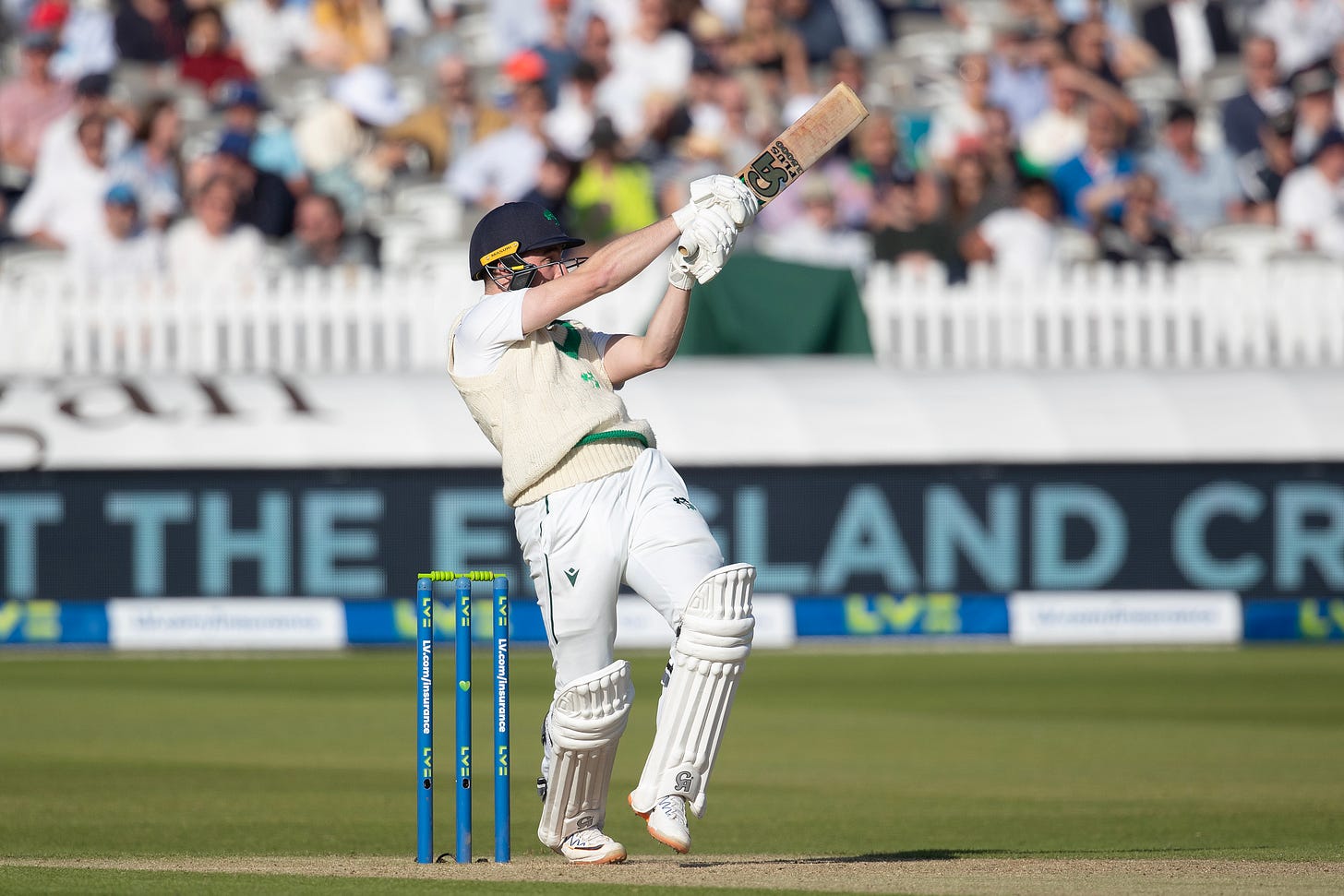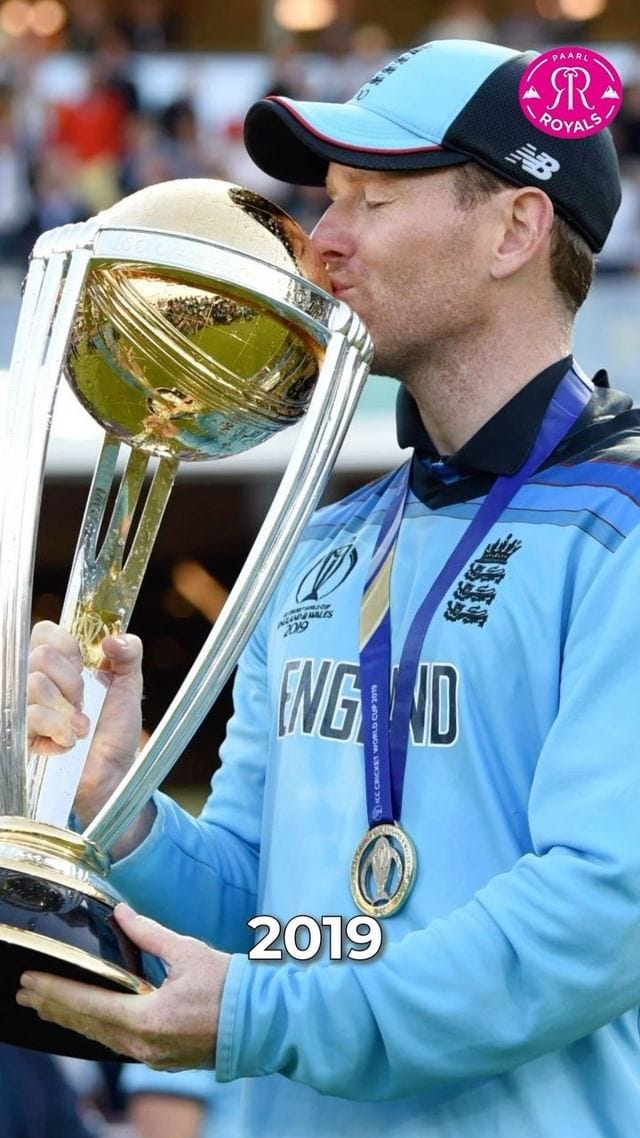Simon Doull is wrong - Test status was not the worst thing to happen to Irish cricket
Sky Sports pundits fail to add nuance to discussion on Ireland's full-member status
Thank god this game was in England and we had the Sky cameras to give us something to talk about.
As we once again waited in vain for the square to dry at an Ireland match this summer, Sky Sports’ rain-filler content threw an unexpected grenade into the never-ending existential treatise on Irish cricket.
During the elongated waiting game, former New Zealand international Simon Doull said on air that Ireland’s elevation to Test status was the worst thing that could have happened to the game on Irish soil.
Eoin Morgan, joining him on the panel discussion, agreed.
This was a five minute television segment, brief with little room for nuance. That is one potential excuse for the chat omitting plenty of counters to an at-best incomplete, if not inaccurate statement. More cynical folk would point to the absence of a current expert on the everyday business of Irish cricket as the more egregious error.
You can watch the discussion here.
Ireland’s handling of Tests, temporarily giving them up only to hastily return, was poorly managed. That is not to say that the entire move to Test status as a whole was a destructive move.
The Sky conversation starts off with host Nick Knight referencing Ireland’s failure to qualify for the World Cup.
“The brutal facts are, Ireland are not where they want to be. Qualification by right didn’t go well, they had a series against, I think Bangladesh, they needed to win 3-0. They had a game rained out then that kiboshed that. Then they needed to qualify in the qualifier and they didn’t manage that. Where are they Doully in the game?”
Let’s move past the fact that Ireland’s hopes to beat Bangladesh 3-0 were always far-fetched. A washout in Chelmsford was not the reason they had to travel to the Zimbabwe qualifiers. The culprit was a pair of defeats to New Zealand last year, by one wicket and one run respectively, that went some way to costing them automatic qualification. Not to mention taking just 25 points out of a possible 90 from Afghanistan, Netherlands and Zimbabwe. I digress…
Here’s Doull:
“It’s a hard one for me, Ireland. I think I’m going to lose a few fans here but I think one of the worst things that’s happened to Ireland cricket is they got Test status. It’s going to sound silly, because you want to test yourself against the best and Test match cricket is still the ultimate for some players. It won’t be the ultimate in the future and it might be very different in 10, 15, 20 years time. Ireland cricket was at its best when their players were playing county cricket. You see those One Day results and their T20 results, they had most of their players playing a very high standard of cricket in the UK. They then transferred that to an Ireland team that played with passion, they were good enough, had plenty of players in and around that side, had a lot of players that had been through situations where they knew how to win or knew how to perform. That’s not, unfortunately, what Ireland have got at the moment."
Let’s once again ignore a pundit’s lack of background knowledge on recent Irish history. Less than 12 months ago, Ireland produced their best run at a T20 World Cup featuring wins over Scotland, West Indies and the world champions England without any players in county cricket. Up to that point, Ireland had always been useless at T20, even when lads were still at the counties.
Again, I digress. Let’s hear Morgan’s response:
“I completely agree with Doully. Doully, you’re not going to lose any friends. Irish people love straight talking. I completely agree because it was where administration - and this is not just Irish cricket but world cricket - administration has driven Test match cricket sort of by the wayside while they’re rewarding Ireland and Afghanistan with Test status. Test match cricket is incredibly expensive to put on. Ireland were given a lot more money as a Test playing nation but they predominantly had to spend it on hosting Test matches. They did it while not having a red ball infrastructure. They have a white ball infrastructure that works reasonably well.”
Another fact-check: Ireland have only been given “a lot more money” as a Test nation now. They earned Test status in 2017. They have also only hosted one Test, against Pakistan in 2018.
The new ICC four-year funding cycle, starting next January, sees Ireland get in the region of $17.5 million a year. That’s roughly four times more than what they were previously getting - granted, around $2-3 million of that each year will be withheld to future proof against the value of TV rights decreasing. Ireland also have a $5 million loan to pay back to the ICC. It’s still a lot more cash than what entered the coffers before.
Morgan continues:
“The best times of Irish cricket were when their best players could piggyback county cricket. They could play against the best players in English cricket or European cricket, world cricket depending on who they played with and against. They would become more professional, more disciplined at a younger age. But ultimately practice facilities, the ability to fail against better players made you a better player over the years. I can say that because I went through it. You look at some of the youngsters coming through Irish cricket now and the talent is exactly the same, talent doesn’t change, it’s there and Irish cricket has it in abundance. I’d say what they lack in the moment is a lot more viable facilities to be able to practice and hone your skills as often as you would do in county cricket, and then ultimately to play against the best players more often than not. The best players in Irish cricket coming through now, the younger generation, are actually the best players in their team, and they’ll be the best players from the age of 21 all the way until they retire. For me, that curbs their learning by a long way, really. They don’t have many players that go and play franchise cricket. There are some great stories with the likes of Paul Stirling that played with Middlesex for a long time. The exceptional Josh Little coming through is still very young in his cricketing years. [He is] going on and playing different levels of franchise cricket, plays with the Manchester Originals, plays in the CPL on occasion, played in the IPL this year for the Gujarat Titans, situations he would have found himself in would have been uncomfortable to start with but he will have learned a high amount and he will continue to do so because he is making mistakes. If he’s to sit in Dublin, play for the Leinster Lightning, play in the system that is created, he’s not going to learn a lot because he’s the best player.”
The above quote is long, but largely correct - apart Little not playing in the CPL yet. The crux of Morgan and Doull’s argument is that Ireland’s domestic system could never fill the gap left by county cricket when it came to developing their players.
That much is uncontrovertibly true. It’s taken Ireland three years to develop players good enough to play internationals without county cricket. Harry Tector, Josh Little, Lorcan Tucker, Curtis Campher, Gareth Delany et al only learned by failing early in their careers at international level. Their timeline undoubtedly would have been accelerated if they entered a county set-up as teenagers.
Cricket Ireland lobbied the England and Wales Cricket Board to still let Irish players play in county cricket as locals. Somewhat understandably, if with a cruel regard for the development of the international game, the ECB said it’s not their responsibility to develop youngsters from overseas.
I of all people do not want to go out to bat for Cricket Ireland. They have undoubtedly made mistakes when allocating funds, the length of time taken to get an adequate training facility up and running in Abbotstown is case in point. Yet you cannot lament their inability to create a good domestic structure without also acknowledging the six-year gap between attaining full membership in 2017 and the significant ICC funding hike coming in 2024.
Finances aside, Morgan himself is an embodiment of arguably the greatest benefit of Test status. If Ireland were still an associate nation, today in Headingley Tector and Little would have been wearing blue, not green. Ireland may not be able to develop their talent as quickly as they need to, but at least now they can hang onto it.
Once the best Irish talent had reason to avoid crossing the Irish Sea, full membership guaranteed enough international fixtures via the ODI Super League to be able to throw Messrs Tector, Little and Tucker into the developmental deep end. At least Ireland had matches against good sides to try and fill the county void.
Ireland’s new rivals, Scotland, are a stark example of the realities of association membership. Though they are a strong team that has beaten Ireland, a full-member, twice in recent times, they had just six days of international cricket this year prior to the World Cup qualifiers in Zimbabwe, two of which were official ICC warm-ups at that tournament.
Ireland don’t play enough fixtures as it is. They definitely did not play enough ODIs in the lead-up to the qualifiers, but it would be worse as associates.
Full membership has not been an easy ride for Ireland. It came too early for the domestic structures, irrespective of the on-field talent of the O’Briens, Porterfield, Rankin, Joyce etc. Yet the funding required to meet the challenges of Test status came too late to minimise the growing pains of missing out on county cricket.
Ireland botched their return to Test cricket this year, opening up too early and receiving offers they couldn’t refuse, such as playing a Test at Lord’s 10 days before the pinnacle event that was the qualifiers. The handling of Test matches has been poor. But the status itself was not a flawed goal.
Cricket Ireland couldn’t come out and explicitly say that they wanted Test cricket more for the funding spike attached to it than for the actual red ball games. Rest assured, that was the thinking. Test matches and more money should have come hand in hand. For whatever reason, the latter lagged behind the former.
The loss of county cricket was a crippling blow to young Irish talent. It could easily be the worst thing to happen developmentally to the game on this island.
Yet the ICC eventually stumping up the cash seven years after the fact, combined with Tector still wearing a shamrock crest rather than a lion one, not to mention Ireland’s participation in the Super League, renders one conclusion:
Test status brought some benefit despite its challenges; it is by no means the worst thing to happen to Irish cricket.






